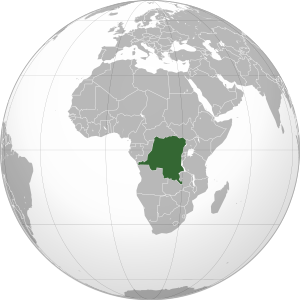Democratic Republic of the Congo
The Democratic Republic of the Congo (DRC), also known as Congo-Kinshasa and formerly known as Zaire, is a country in Central Africa. By land area, the DRC is the second-largest country in Africa, after Algeria, and the 11th-largest in the world. With a population of around 112 million, the Democratic Republic of the Congo is the most populous officially Francophone country in the world. The national capital and largest city is Kinshasa, which is also the economic center. The country is bordered by the Republic of the Congo, Central African Republic, South Sudan, Uganda, Rwanda, Burundi, Tanzania (across Lake Tanganyika), Zambia, Angola, the Cabinda exclave of Angola and the South Atlantic Ocean.
Notable Events
Floods
In December 2022, torrential rains destroyed hundreds of homes and killed 169 people in the capitol Kinshasa.[1] At the US-Africa Summit 2022, Congolese President Felix Tshisekedi said
"Support must come from countries that pollute and unfortunately trigger the harmful consequences in our countries that lack the means to protect themselves".[2]
On the 5th May 2023, according to the regional official of South Kivu province, located in the east bordering Lake Tanganyika, torrential rains resulted in rivers to overflow and caused significant damages and killed at least 176 people in the villages of Bushushu and Nyamukubi.[3]
External Links
- Climate Change Overview Country Summary World Bank Group
- Interactive Country UN Environment Programme
References
- ↑ 29 April 2023 Democratic Republic of Congo: Floods in Kinshasa, Operational Update OCHA
- ↑ 14 December 2022 DR Congo: Floods devastate Kinshasa, causing landslides DW
- ↑ 5 May 2023 At least 176 people killed in eastern DR Congo floods Al Jazeera
